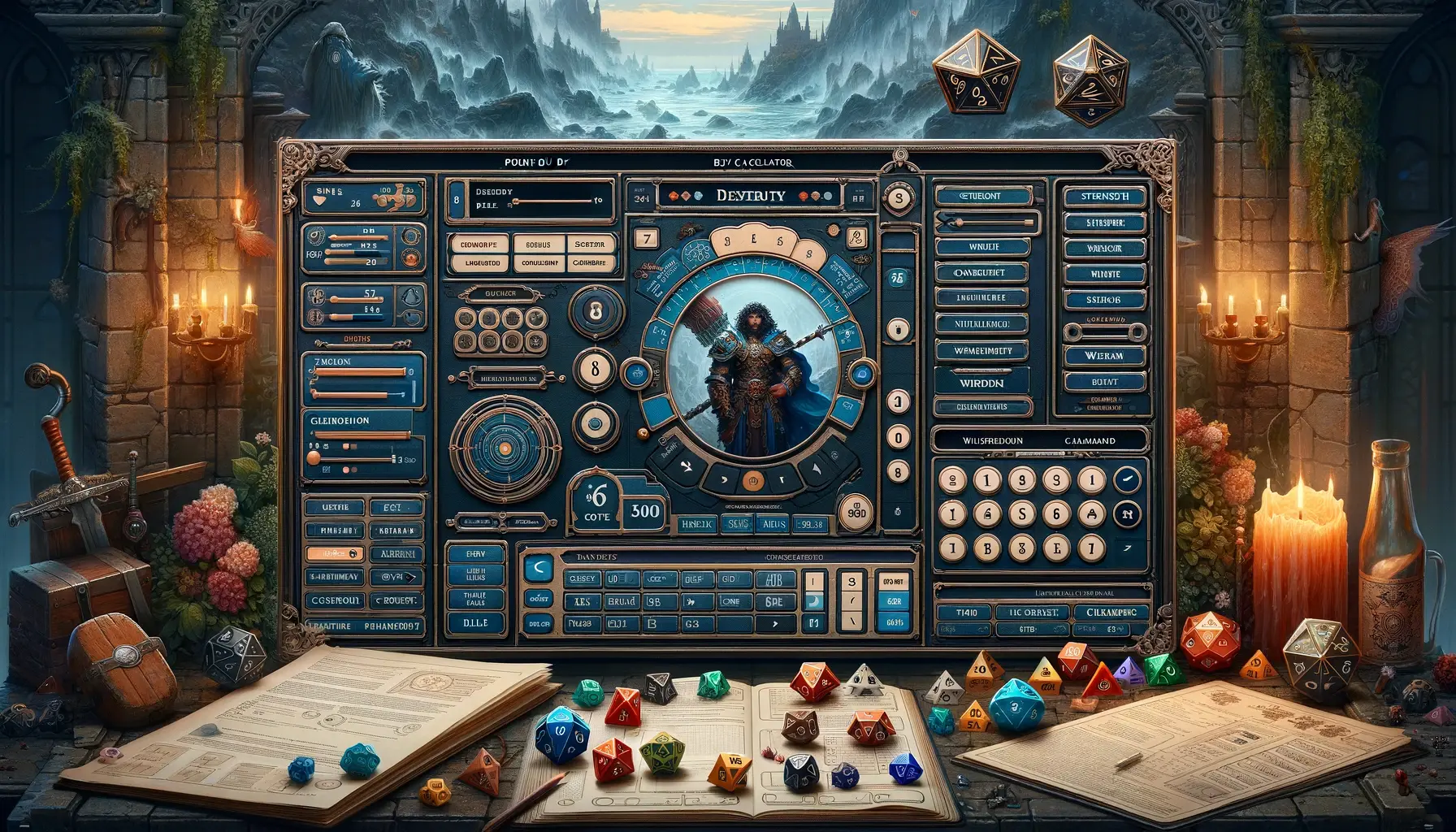5e Blogs
5e Point Buy Calculator: Mastering Character Creation

Table of Contents
Chapter-by-chapter guide:
How to utilize the Point Buy calculator cruncher for 5e?
What is D&D point Buy?
What are the standards for D&D 5e point Buy?
How would I work out capacity score modifiers?
Whether you’re uncertain how the fifth release of Prisons and Winged Serpents’ point buy framework works, or you’re a veteran player making many characters consistently, the point buy calculator 5e cruncher for 5e is here to help! This web-based instrument empowers you to explore the 5e point buy calculator direct Buy framework toward doling out capacity scores for your D&D character — with help from the authority SRD races and their 5e capacity score rewards. In this way, get a pen and paper, and we should make your D&D character!
Read for more Amazing 5e Blogs
How to utilize the point buy calculator 5e cruncher for 5e?
How about we make a Tumbling check and bounce right to figuring out how the point buy mini-computer for 5e point buy calculator works?
Enter your base capacity scores. These are the scores that you spend your focus on. You can likewise perceive how your point use adds up, in light of the point cost table shown later in this article.
Select your personality’s race. Your personality’s capacity scores in 5e are expanded given which race you pick.
If your personality’s race isn’t on the rundown, you can choose Other and enter the racial rewards yourself.
A few races have free-drifting +1s that can be doled out to capacity scores. Remember to choose which capacity scores you’d like helped!
Find your personality’s capacity scores summed up in a table at the lower part of the 5e point buy
mini-computer. Above all, the table records your personality’s complete scores and their modifiers.
Capacity scores and modifiers. A capacity modifier isn’t added to a capacity score in 5e. All things being equal, the not-set-in-stone capacity score is added to expertise looks represented by that capacity. For instance, a person with an Insight score of 15 has a modifier of +2, and thus gets a +2 reward for Arcana checks they make.
To alter them 5e point buy calculator direct buy framework to fit your table’s home standards, you can enter progressed mode to:
Raise or lower the point absolute that you can spend from 27;
Change the most reduced and most elevated available capacity scores from 8 and 15, separately; and
Change the point costs per capacity score.
The Ultimate Guide to Mastering Compelled Duel in Dungeons & Dragons 5e
What is a D&D point buy?
It’s extraordinary that the point buy mini-computer for 5e can do the point buy math for you, yet if you’re just about as inquisitive as the Xanthan, you’d need to know how the 5e point buys framework functions. So, we should move an examination check and draw a nearer look.
D&D characters have six capacity scores (you can peruse more about them further down this article) that administer their different qualities as a whole. How a player decides these measurements depends on their prison expert (or DM), yet most D&D tables utilize one of these strategies:
The standard exhibit technique, where the player has the scores 8, 10, 12, 13, 14, and 15 and can relegate them any way they like;
The dice roll strategy, where you’d haphazardly create your capacity scores with dice; and
The point-buy strategy, where you have a financial plan of focus to spending on the ability to buy scores.
In this way, presently you’ve found that point buy-in D&D 5e is a technique to decide player characters’ capacity scores. You probably moved a characteristic 20 for that Examination check!
The Comprehensive Guide to Crown of Madness 5e: Strategies, Mechanics, and Creative Uses
What are the standards for D&D 5e point buy?
fifth release D&D’s point-buy rules let you burn through 27 focuses to buy capacity scores. The player should buy six scores and can relegate them to the six capacities as they like. Each score has a point cost:
Capacity score
What’s more, that is all there is to it! Presently you know precisely how to do point buy-in 5e.
Advanced Customization Options
The 5e point buy system offers a level of customization that allows players to tailor their characters’ ability scores to fit their gameplay style or campaign’s house rules.
By entering the calculator’s Advanced mode, players have the option to modify the total number of points available for distribution, adjust the minimum and maximum purchasable ability scores, and even alter the cost per score.
This flexibility enables Dungeon Masters (DMs) and players to balance the game according to their preferences, whether aiming for a more challenging experience or allowing for more powerful characters from the outset.
Choosing Your Character’s Race and Class
Selecting a character’s race and class is a critical first step in the point buy process that sets the foundation for their abilities and role within the party. Each race in Dungeons & Dragons offers unique bonuses and traits that can significantly impact how points are distributed among ability scores.
Similarly, the choice of class dictates the character’s primary abilities and strengths, guiding players on where to allocate points to maximize effectiveness. Understanding the synergies between race and class can lead to more cohesive and compelling characters, tailored to the players’ envisioned roles and narratives.
Min-Maxing vs. Balanced Characters
The point buy system caters to various character creation strategies, including min-maxing and crafting balanced characters. Min-maxing involves focusing on maximizing key ability scores at the expense of others to create a character that excels in specific areas, which is particularly useful for players looking to optimize their character’s performance in their chosen role.
On the other hand, aiming for a balanced character with more evenly distributed ability scores can ensure no significant weaknesses, making the character more versatile and adaptable to different challenges. Examples of ability score distributions illustrate the potential outcomes of each approach, helping players decide which strategy aligns with their gameplay preferences.
How would I ascertain capacity score modifiers?
To ascertain a capacity score’s modifier straightforwardly, deduct 10 from the score and split it (adjusting down to the closest number). Or on the other hand, you can counsel this helpful table:
Capacity scores and related modifiers.
Recall that capacity scores impact capacity modifiers and not the opposite way around! You don’t add a capacity modifier to the score. All things being equal, you add a capacity modifier to any expertise checks you make with that capacity. What are the six capacity scores in D&D?
D&D 5e has six capacities that address various parts of a person:
Strength — normal physicality and real power;
Ability — actual deftness and reflexes;
Constitution — wellbeing, and endurance;
Insight — mental and scientific expertise;
Shrewdness — mindfulness and instinct; and
Charm — certainty, and power of character.
All animals in D&D, including the players’ characters, have these capacities and related scores. For instance, an orc has a high Strength score but a low Insight score.
Common FAQs and Misconceptions
There are several common questions and misconceptions about the 5e-point buy system. For instance, the system does not allow any single ability score to exceed 15 before applying racial bonuses, ensuring a level of balance among characters.
Comparisons between point buy and rolling for stats reveal that point buy offers a consistent baseline for all players, eliminating the potential disparities in character strength that can arise from random dice rolls.
Additionally, the system requires the use of all 27 points, preventing players from allocating extremely low scores to certain abilities without compensating with higher scores in others.
Conclusion
The 5e point buy system offers a robust and flexible framework for character creation within Dungeons & Dragons, providing players with a method to craft characters that align closely with their envisioned playstyle and narrative role.
By understanding and utilizing advanced customization options, carefully selecting race and class, strategically choosing between min-maxing and balanced character builds, addressing common questions and misconceptions, and considering the impact of racial bonuses on final ability scores, players can navigate the complexities of point buy to their advantage.
This approach not only enhances the character creation process but also contributes to a more balanced and engaging gameplay experience for everyone involved in the campaign.













